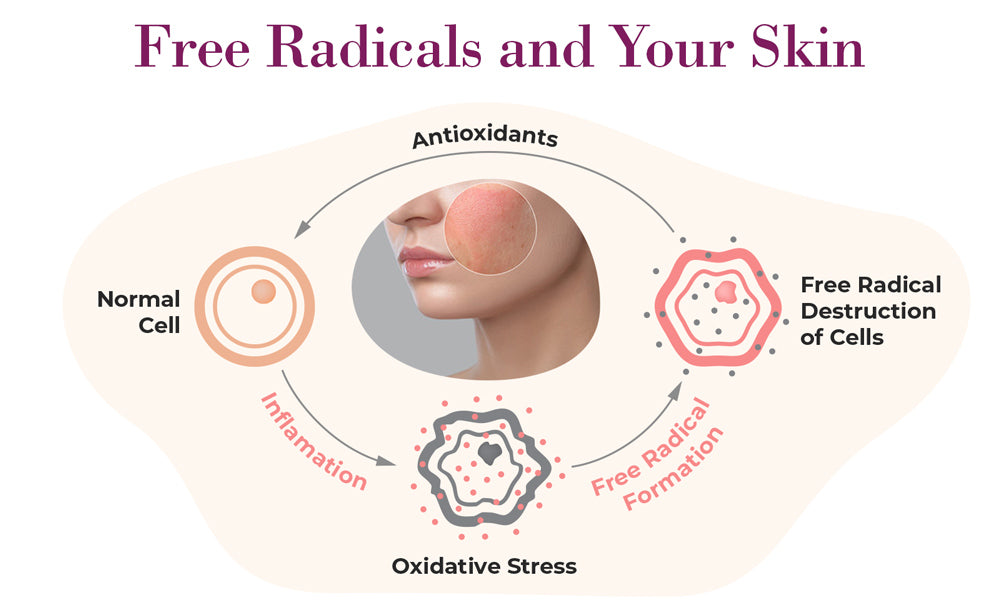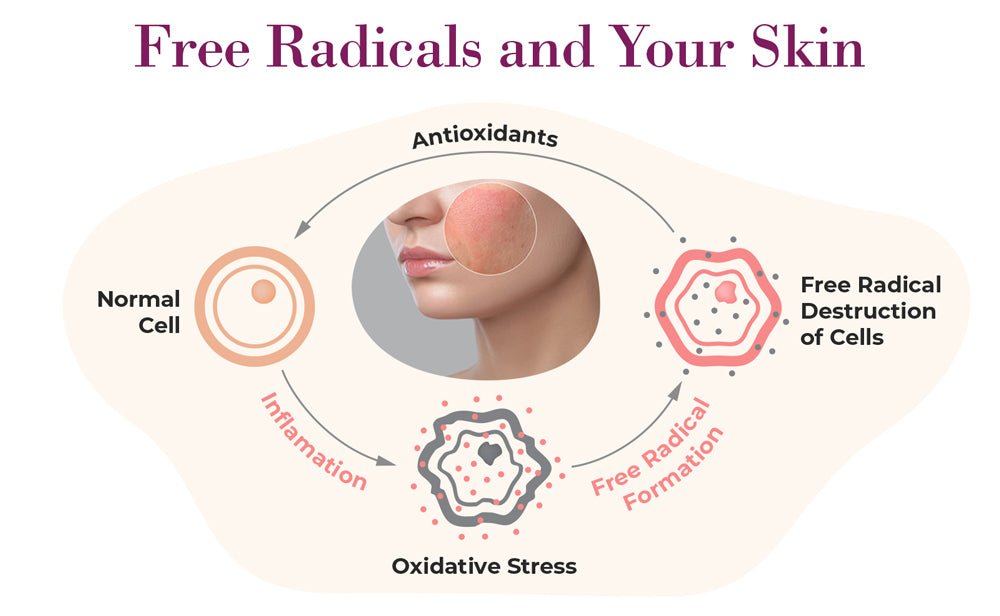Free Radicals: How They Can Help or Hurt Your Skin
A war is being waged by every cell in your body on a daily basis. It is called oxidative stress. This happens from free radicals that are formed when you inhale smog, cigarette smoke, exposure to sunlight or germs trying to invade your skin, or even from eating highly processed, high sugar foods. Sometimes your body, including your skin makes free radicals to help protect you from invaders and danger, knowingly creating some harm for the greater good, and some free radicals also occur as a result of normal cell functions.
Each human cell endures approximately 10,000 "hits" per day from free radicals that destroy enzymes, proteins, fats, DNA molecules, cell membranes and structures. Left alone they can cause damage that could lead to cancer and premature aging, among other issues. But free radicals are not all bad all the time and can help protect us in some situations, the damage is done when they build up beyond our body’s ability to appropriately neutralize and clear them.
Antioxidants are the antidote to free radicals. They help neutralize them after the fact and can even prevent formation of free radicals to some extent as well. Antioxidant rich skin care products, foods and supplements can help protect us by blocking and neutralizing damaging free radical insults.
Let’s start at the beginning
What are free radicals and antioxidants? Free radicals are highly unstable and toxic molecules that form as oxygen and other molecules’ bonds are broken in a process is called oxidation (think of iron rusting over time. The fix is to restore the missing electrons which is what antioxidants do. Our antioxidant system includes both antioxidants made in our body (endogenous) and that which we get from our diet or supplements (exogenous).

As humans we don’t make much in the way of antioxidants because we have evolved, compared to plants, to be mobile, i.e., to move out of the way of danger, such as ultraviolet radiation (aka sun exposure) and pollution. We also are meant to be smart enough to avoid foods that are inflammatory or toxic. Plants are not mobile, so they have adapted to create antioxidants to combat the dangers from the environment to help them thrive under otherwise near impossible conditions- think desert, where there’s only sand and sun and no water, yet somehow cacti survive and thrive. When we eat those foods, we get the value of their antioxidants. Therefore, a plant based, whole food diet with limited meat consumption is ideal. When we adapt these antioxidants for skin care, in carefully formulated products we can have the benefits directly for the skin as well.
My favorite antioxidants in skin care include Niacinamide, Vitamin C and peptides. The active ingredients drive the products but it’s the supporting ingredients, called the vehicle, that drives the end result. Together this is what sets one product apart from another, it’s what makes one product better than a seemingly equal one with the same ingredients.

Niacinamide: This water-soluble Vitamin B3 has many skin benefits, whether taken orally or used in skincare products and is one of my favorite ingredients both topically and orally, in all skin types. Research shows oral niacinamide can help prevent skin cancer and slow the development of skin cancers. It helps with stem cell properties of skin cells, differentiation, and senescence and with barrier repair and hydration since it supports the synthesis of ceramides. Think of ceramides as analogous to glue, holding skin cells together, in a good way, preventing excess water loss from the skin and allowing your skin to optimally rejuvenate itself. It has anti-inflammatory benefits and, by lowering sebum excretion helps control acne and can make your pores appear smaller. It also helps with cell metabolism by supporting mitochondrial function (mitochondria are the energy powerhouses of our cells). Other important benefits include helping even out skin tone.
Vitamin C: Think of Vitamin C as a free radical quencher, but you need the right formulation and in the right concentration. It can be very unstable so it needs to be stabilized in order to be able to do it’s job without losing efficacy right after you open the bottle.
Peptides: There are many different peptides but all of them are proteins that, depending on the source and quality, can help with collagen production and skin rejuvenation.
Bottom Line
Free radicals are unstable toxic substances that are created as a by product of normal cell activity and as a function of your body protecting itself against a variety of insults. If left unchecked they can do much damage and the way to prevent this is by eating a healthy diet and using products that contain antioxidants to help quench them before the damage is done.





![[The Science ] of Longevity: A Skin Focused Approach](http://dorisdaymd.com/cdn/shop/articles/Longevity3-9658695.jpg?v=1765451344)